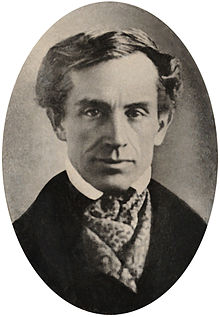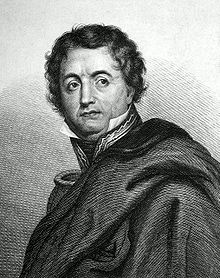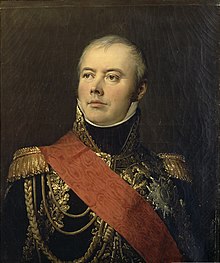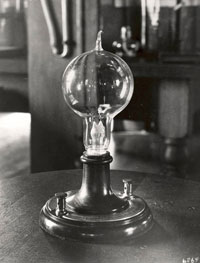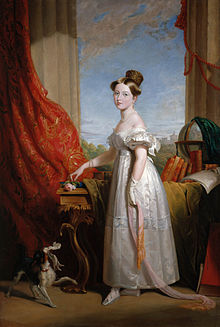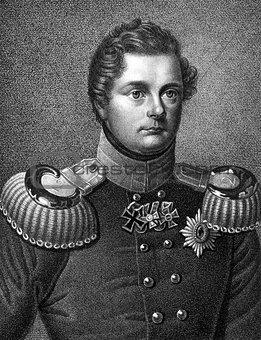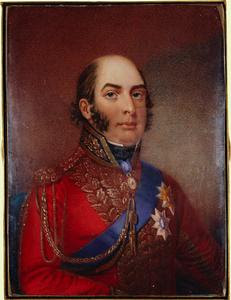Those words were uttered behind closed doors after Goodyear's rampage hours before. The French Imperial extended family was staying in the
Schloss Steinadler, a new palatial complex built explicitly for the Congress. Napoleon I, Napoleon II, Soult and MacDonald drew up their strategy for the upcoming politicking.
Their strategy was as follows:
- Prevent Russia from drifting into the Prussian Camp
- Reaffirm French sovereignty over Canada and the South American holdings
- Discuss England's current situation
- Establish new trade routes with the expanding Dutch Malaysian regions and assist in the crushing of Chinese pirates
- Bring up the topic of the Orient for the first time
- Push for rights to new African colonies
Preventing Russia from joining the Prussian camp was Napoleon I's primary concern. Friedrich-Wilhelm's own daughter, Charlotte, had become Alexandra Feodorovna, Empress Consort of Nicholas, in 1819. That fact was a huge problem. Charlotte already hated Napoleon I because of bad memories from her childhood, when French troops came in and forced her family to flee as Caesar marched through the Brandenburg Gate. If she influenced Nicholas, very, very unfortunate things would possibly follow. Nicholas acted like an uncle to Napoleon II, but if the Second Caesar showed himself a threat, he might consider action. This would not be allowed if Napoleon I could help it.
With the North American colonies, France was determined to make sure the Republican Union kept its paws off Canada. Caesar had also been growing suspicious of rumors about how the R.U. had considered invading the Green Mountain Republic of Vermont, which was an immensely useful buffer state. The possibility of a per-emptive strike and invasion by France was on the table if Vermont didn't accept a future offer of military support and monitoring.
With the South American colonies, France was growing wary of the growing alliance between the Republic of Gran Colombia and the massive Republic of Peru. Brazil and Argentina were stable, but if a conflict ever occurred on the other continents, the Colombia and Peru might act and seize large chunks of the two colonies. To remedy this, Napoleon II suggested playing the South Americans off of Mexico, a hated usurper to all its neighbors.
In the Kingdom of England, resentment boiled. Edward was a moderately successful leader, and had managed to salvage what was left of the economy, but having French troops in Cornwall Scotland, and Mann, as well as the Welsh dictatorship, on formerly sovereign soil made many English discontent. Violently discontent. Riots had broken out from London all the way up to Scotland. Edward was fearing for his life, and refused to leave the palace for fear of assassination. If terrorized enough for his own well-being, chances were high he would let France do anything it wanted to keep him in power. If it took having members of the Old Guard patrolling Buckingham Palace, Edward would do it.
Edward's daughter was also growing into a pretty young woman. She was almost 14, the age when many European royals were prepared for marriage, and she showed no signs of hereditary mental illness. Napoleon I had considered her likely to marry a duke of some sort and live quietly, but he was thoroughly discouraged by her apparent interest in young Alexander II of Russia. If they were married, their child would be one quarter Prussian, two quarters Russian, and one quarter English, which spelled nothing but the true meaning of the word "holy terror" to the Bonapartes. The very
idea that a Russian Czar might, in the future, hold claim to the English throne, was a
nightmare for France.
Princess Victoria of England
Alexander II of Russia
Louis, King of Holland and Napoleon I's brother, had attained exclusive rights to the Malay Archipelago during the World Congress of Vienna. In the years since, it had proved a very profitable prize indeed. The islands had a growing Christian population, and the money from all the spices, herbs, and animals was making tiny Holland a force to be reckoned with. Clearly, more trade routes with France would be mutually profitable.
The Orient had been a mysterious place for centuries. Past the Himalayas and the Hindukush laid the massive Chinese Qing Empire, a hugely outdated backwater of almost half a billion people. Further to the north-east was Japan. Napoleon's personal explorers had reported back claiming that Japan was "far too entrenched and stable." They said that there was little to be gained by trying to open them up. The only fruits of the voyages to Japan were the katana swords brought back, which were put on display in the Hall of Glass. China, meanwhile, was considered ripe for the taking. Trade between the Qings and Europeans had been going on since 1793, but the current Emperor, Tao-Kuang, was struggling miserably with the onslaught of opium coming into the country. The Chinese army was a relic of the Renaissance. And the South-East Asian Chinese vassal states were starting to fall under influence from the encroaching Dutch. It was an interesting set of circumstances to Napoleon I.
Finally, the newly-announced Prussian expansion in Africa was a huge blow against France. The more colonies owned by rival countries there were, the more non-French items there were on the international market, jeopardizing Napoleon's dream of world-wide monopoly. Prussia had made it known they had little desire for anything north of the Sahara Desert. Thus, Napoleon II suggested a Spanish invasion of North Africa, through Morocco. Then, Spain would just claim everything down to the South Sahara that wasn't already claimed. This move had the potential to anger the Ottoman Empire, but the Bonapartes considered it worth the risk.
WORLD CONGRESS OF BERLIN: PART III
Friedrich-Wilhelm IV of Prussia and Hanover
As the Congress officially convened to discuss business, Friedrich-Wilhelm III brought the Crown Prince to take over most matters. The prince was 37 and hardly handsome or charismatic, but he knew how to get things done and he was determined to poke his counterpart Napoleon II to test the waters of the future.
The Prussian king had already met with Czar Nicholas, offering an alliance, during the time the Bonapartes occupied the Schloss Steinadler. Nicholas was luke-warm to the idea. For one thing, he did not know Friedrich-Wilhelm II enough to know if he was a competent future ally.
When the Prince sauntered out and began brutally laying down the law to the Bonapartes, Nicholas's ears perked up. Everything was a fight from July 6th onward.
Concerning Canada, July 6th, 1832:
The Republican Union representatives, still boiling with rage over the Eisenbahn Affair, were hardly able to keep themselves from cursing Napoleon's name as he talked about total French hegemony in Canada and Louisiana. The Union still held that they had not been fairly compensated during the last Congress, and that Miles Romney's accepting of Nova Scotia in exchange for dropping all claims to Canadian territory was not official or endorsed by the R.U. government. When France refused to give them one inch of soil north, Goodyear pitched a fit, screaming every European racial epithet he knew. He left the building for some minutes, then returned, a look of total calm on his face. Once more, he plead his case, and when France rejected it, he left again. Little did anyone know he was signalling a Union officer outside to start sending word to Philadelphia to annex Vermont. That done, Goodyear ceased to argue the matter and sat there "with that frightening grin on his face."
Matters Concerning South America, July 6th-7th, 1832:
When the time came to discuss South America, Napoleon II rose to speak. He immediately cited abuses of the Peruvians and Colombians at the hands of the Mexicans, and brought up the possibility of alliance. The Mexican representatives, seeing full well what was happening, immediately left in rage. After some hours of discussion, the Spanish Emperor was satisfied that no attack would be coming from South America.
Concerning England, July 7th-10th, 1832:
England was a whole other can of worms. Immediately upon hearing of the possibility of French troops stationed in London, many other national leaders called it an invasion. In particular, Prussia and Denmark-Norway thought it yet more French tyranny. They were shocked when the bald, fat Edward VII rose from his seat and backed up the Bonapartes. After days of intense quarrels and arguments, Napoleon decided to do what he wanted and announced French troops would be sent in to support and protect the English royals. From that point on, France's rivals were secretly supporting the idea of a Second English Civil War to depose "Edward the Puppet."
Edward VII, "The Puppet"
Holland immediately accepted France's offer of new trade routes, and several other countries also got in on the deal, providing a good boost to Europe's economy. Afterward, France and most of the nations present approved of a future Dutch invasion of Indochina to take it from the Qing's vassals. All of Europe was growing tired of paying China's high prices, and a unified effort was agreed to be made to take down the Qing Dynasty and replace it with a pro-Western colonized republic or oligarchy. It was guaranteed by the major powers that no one would attempt to force their own crowns over the Chinese, like the French had done in South America.
Concerning Africa, September 20th-October 8th, 1832:
After the Asian topic, the Congress dragged on. Hundreds of small affairs were settled and discussed. Over all the noise, though, was the looming titanic battle for Africa. Prussia made the first move, finalizing their plans and making them official. France and Spain countered, claiming the Sahara and much of the north-western coast. Friedrich-Wilhelm IV raged, and tried to get Sweden, Russia, and Austria to assist him. Russia spoke up now and then, but the others did not. In the end, a stalemate was reached, but many agreed that for the first time, France had not gotten what it wanted. They surrendered a goodly amount of territory from the quickly sketched boundaries of "French Sahara."
Surprise Announcement, October 20th, 1832:
The Bonapartes were glowering over their defeat in the Africa Matters, and were longing to make it up somehow. Napoleon I pulled out a wild card and announced that not only would his son be Caesar of the French and Emperor of the Spanish, but also Emperor of the "United Empire of Brazil and Argentina." The effect of this, as it was, was not much physically. All it basically was was a change in name from colony to empire. However, it meant that upon Napoleon I's death, Napoleon II would be emperor of four empires (if he indeed inherited the Austrian crown). Napoleon II was getting set up with a massive superiority complex, and everyone knew it.



Once again, the shit has hit the fan.
The Spanish-American War analog seventy plus years early, and the Peninsular War/Latin American Wars of Independence analog twenty plus years late were both simply brilliant.
So this is how the Bonapartes lose it; by getting to damn powerfull. The bigger they are the harder they fall.





